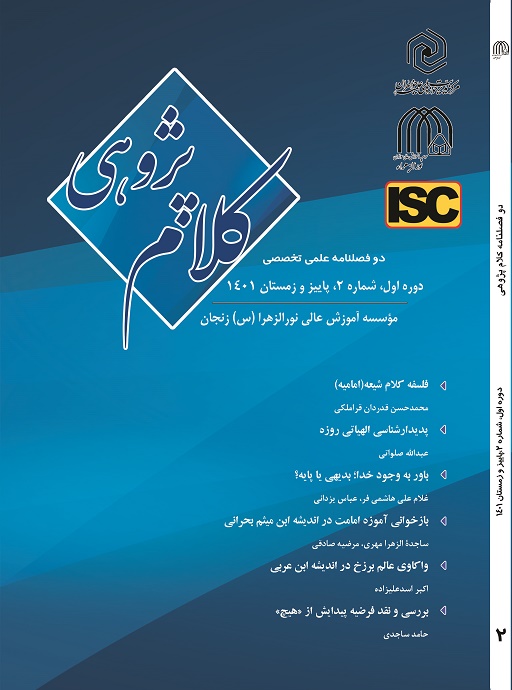نوع مقاله : مقاله پژوهشی
نویسندگان
1 دانشجوی دکتری فلسفه و کلام اسلامی، دانشگاه قم، قم، ایران.
2 استاد، گروه فلسفه و کلام اسلامی، دانشگاه قم، قم، ایران.
چکیده
قرآن کتاب مرجع تمام مسلمانان، به زبان عربی ساده و «تِبْیاناً لِکُلِّ شَیْءٍ» است، این کتاب شریف دارای متنی ثابت و عباراتی محدود است. درحالیکه حقایق هستی، بیکران است، این متن ثابت با عبارات محدود که میتواند بیانگر حقایق لایتناهی وجود، فارغ از قیود زمان و مکان و ماده باشد، ما را متوجة این نکته میکند که میبایست بیکرانگی را در معانی باطنی قرآن جستجو کرد، پس این پرسش مطرح میشود که «راه دستیابی انسان بهعنوان تنها مخاطب قرآن، به دریای بیکران حقایق و معانی قرآن چگونه است؟» هدف این پژوهش، یافتن پاسخ این پرسش در آثار «علامه حسنزاده» بوده و تجزیه و تحلیل مطالب ایشان همراه با استدلال نگارنده است که با روش توصیفی تحلیلی و مطالعۀ مکتوبات و منقولات ایشان انجام شده و ضمن استفاده از نظرات و دیدگاههای ایشان بهعنوان مقدمات قیاس، به این نتیجه رسیده است، اگرچه عموما ظاهر قرآن الفاظ ساده و معانی آشکار است اما باطنش، معانی کلی مرسل است؛ زیرا حضرت خاتم صلوات الله علیه، آن را در اشتداد وجودی و در اعتلا به مرتبۀ فوق تجرد عقلی که مقام «لایقفی» نفس انسان است تلقی کردهاند و از آنجا که هیچ ادراکی بدون مناسبت و سنخیت حاصل نمیشود و هرکس بهقدر سعۀ وجودی خود قادر به ادراک است، تنها راه دستیابی به بیکرانگی معانی قرآن، درک این رتبۀ وجودی نفس، یعنی مرتبه لایقفی و فوق تجرد است.
کلیدواژهها
عنوان مقاله [English]
Semantics of the phrase "Tebbiana Lakul Shi'e" in the Quran with emphasis on the anthropological opinions of Allameh Hassanzadeh Amoli.
نویسندگان [English]
- Osam Salmanian 1
- Ali Allahbedashti 2
1 Ph.D. student of philosophy and Islamic theology of Qom University
2 Professor, Department of Islamic Philosophy and Theology, University of Qom, Qom, Iran.
چکیده [English]
Qur'an is the reference book of all Muslims, in simple Arabic language and "explanatory for all things", this honorable book has a fixed text and limited expressions. While the truths of existence are infinite, this fixed text with limited expressions that can express the infinite truths of existence, regardless of the limitations of time, space and matter, makes us aware of the point that we should search for the infinity in the inner meanings of the Qur'an, so This question is raised that "how can a person, as the only audience of the Quran, reach the boundless sea of truths and meanings of the Quran?" The purpose of this research is to find the answer to this question in the works of "Allameh Hassanzadeh" and the analysis of his content is accompanied by the author's argument, which is done with the descriptive analytical method and the study of his letters and documents, while using the opinions and His views as the preliminaries of the comparison have reached this conclusion, although generally the appearance of the Qur'an is simple words and obvious meanings, but its inner meaning is the general meanings of the messenger; Because Hazrat Khatam, may God bless him and grant him peace, has considered it as an existential intensity and as an elevation above intellectual celibacy, which is the "unworthiness" of the human soul, and since no perception can be achieved without appropriateness and wisdom, and everyone is capable of It is perception, the only way to reach the limitlessness of the Quran's meanings is to understand this existential level of the self, that is, the level of non-existence and celibacy.
کلیدواژهها [English]
- Tebyanay Lekul'
- '
- shayٍٍْ
- Hassanzadeh Amoli
- Semantics
- position of Laiqfi
- unity of evidence and evidence

